 Dr El Ziq, WHO Representative to Saudi Arabia (right) addresses a meeting on the successful conclusion of this year's hajj3 September 2017, Makkah – The World Health Organization (WHO) today concluded a successful mission to Saudi Arabia to support the Ministry of Health in ensuring a safe hajj season. No disease outbreak or public health event of concern was reported among the nearly 2.4 million pilgrims visiting the holy sites during this year’s hajj, in spite of an increased number of pilgrims performing hajj this year.
Dr El Ziq, WHO Representative to Saudi Arabia (right) addresses a meeting on the successful conclusion of this year's hajj3 September 2017, Makkah – The World Health Organization (WHO) today concluded a successful mission to Saudi Arabia to support the Ministry of Health in ensuring a safe hajj season. No disease outbreak or public health event of concern was reported among the nearly 2.4 million pilgrims visiting the holy sites during this year’s hajj, in spite of an increased number of pilgrims performing hajj this year.
WHO's mission to Saudi Arabia was conducted as part of a range of activities undertaken by the Organization to support countries in ensuring effective implementation of the core public health capacities required under the International Health Regulations (IHR 2005) to prevent, detect and rapidly respond to any public health threat before it becomes an event of international concern. These activities are also outlined in the Regional Director's roadmap which details a set of strategic actions to guide WHO’s work with Member States for the next five years.
In preparation for the hajj, the Ministry of Health, with the support of WHO, intensified readiness, preparedness and response efforts to address any possible health threats that might occur during the hajj. In accordance with the IHR 2005, the Ministry developed a comprehensive plan to implement essential public health mitigation measures, including undertaking detailed preparedness and response efforts to address any potential transmission of cholera, Middle East respiratory syndrome coronavirus (MERS-CoV) or other infectious diseases. In addition, it demonstrated effective capacity in surveillance to ensure early detection and rapid response, infection prevention and control, laboratory, coordination, risk communication and community engagement. The Ministry of Health also deployed 30 000 health care professionals to work in 15 hospitals and 93 health care centres in Makkah, Mina, Muzdalifah and Arafat to serve and protect the health of pilgrims.
In light of the current cholera outbreaks taking place in some countries, the Ministry of Health also undertook intensive preparedness and risk mitigation measures to prevent potential transmission of cholera from pilgrims travelling from these countries and no confirmed cholera cases have, so far, been reported among those attending the hajj.
In anticipation of the higher temperatures expected during this year’s hajj, the Ministry of Health developed a comprehensive plan to prevent and respond to any negative health effects experienced by pilgrims as a result of excessive temperatures. Advice was provided on how to prevent sunstroke and concrete measures were put in place to reduce their negative impact on pilgrim's health. The plan also included measures to ensure the prompt treatment of any pilgrims experiencing heat exhaustion. According to preliminary information, an increased number of pilgrims were reported as suffering from heat exhaustion as a result of the high temperatures but health services were well prepared and provided timely treatment to those in need.
Morbidity and mortality rates from seasonal influenza were also lower this year, as compared to previous years, due to increased uptake of the seasonal influenza vaccine among pilgrims from Saudi Arabia and other countries. This year, the vaccine was a compulsory requirement for all pilgrims from Saudi Arabia. Countries strictly adhered to the recommendations issued by Saudi Arabia to protect people’s health during the hajj, including vaccination against seasonal influenza, meningococcal meningitis, polio, yellow fever and other diseases.
Of all the samples collected and tested by the national public health laboratory in Makkah, none were found to be positive for MERS-CoV, and so the authorities in Saudi Arabia are happy to report no cases of MERS among pilgrims during this year’s hajj.
As a result of the Ministry’s intensive preparations and with the support of WHO’s 4-member technical team, headed by the WHO Representative for Saudi Arabia, to oversee, guide and advise on appropriate public health preparedness measures to prevent outbreaks, the hajj of 2017/1438 H has successfully taken place with no reports of any major public health events.
Related link
WHO statement on successful conclusion of this year's hajj


